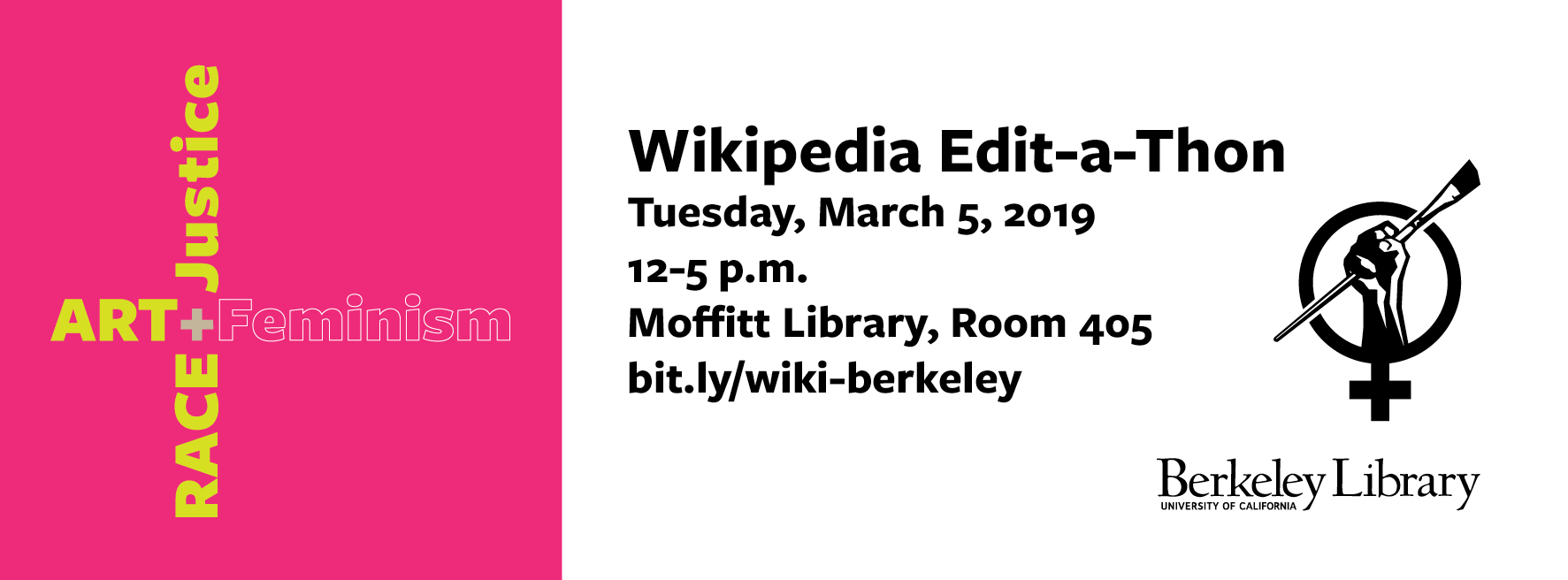Tag: wikipedia
Wikiphiliacs, Unite! (At our Wikipedia Editathon, on Valentine’s Day, 2024)
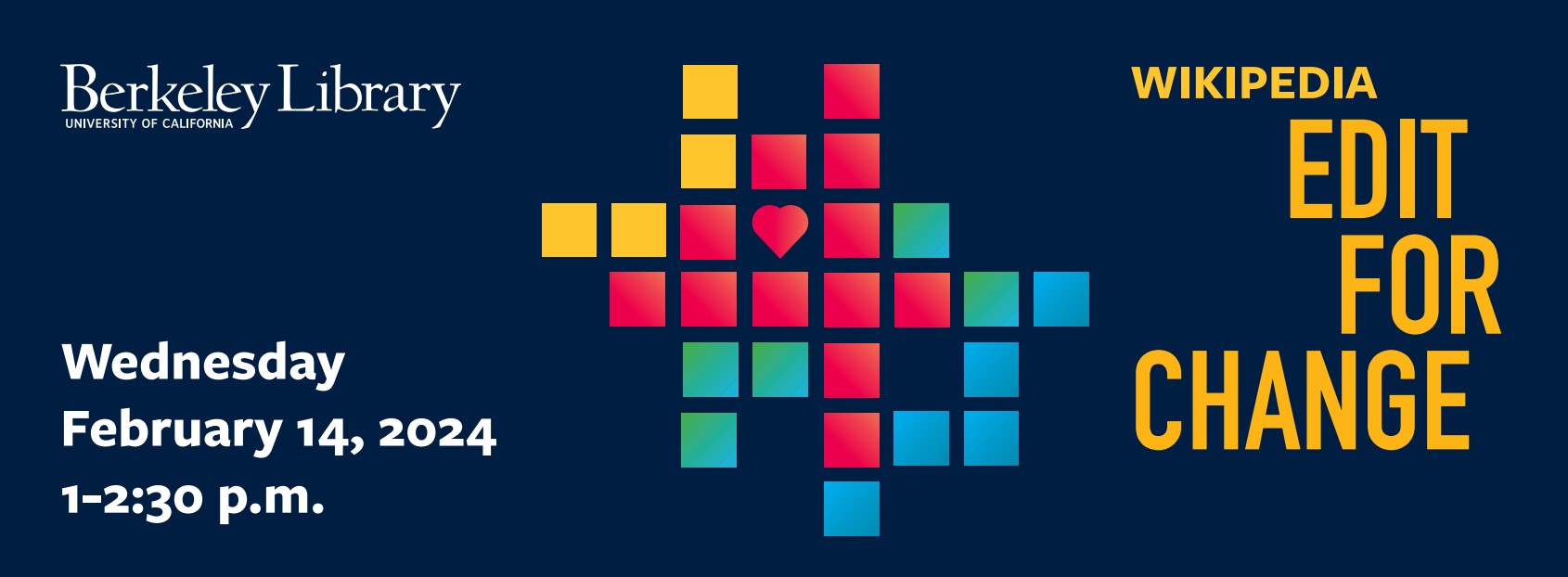
I am a proud Wikiphiliac. At least, according to the Urban Dictionary, which defines Wikiphilia as “a powerful obsession with Wikipedia”. I have many of the signs it warns of, including “accessing Wikipedia several times a day…spending much more time on Wikipedia than originally intended [and]… compulsively switching to other Wikipedia articles, using the hyperlinks within articles, often without obtaining the originally sought information and leaving a bizarre informational “trail” in his/her browsing history” (but that last part is just normal life as a librarian).
How else do I love Wikipedia? Let me count the ways! As a librarian, I always approach crowd-sourced information with a critical eye, but I also admire that Wikipedia has its own standards for fact-checking, and in fact some topics are locked to public editing. It takes its mission very seriously. It also has an accessible and neutral tone. Especially when I want to learn about a technical topic, it can give me a straightforward and helpful way to approach it. I also use it pretty routinely as a way to look at collections of sources about a topic; when I was a medical librarian, I was asked for data on the condition neurofibromatosis, and at that time the best basic links I found were in the references for the Wikipedia article. Last and maybe most importantly, the fact that anyone can edit is a huge strength…with challenges. Wikipedia openly admits its content is skewed by the gender and racial imbalance of its editors, and knowing this is part of approaching it critically, but it also means that IT CAN CHANGE, and WE CAN CHANGE IT.
Given that philia, a word taken from Ancient Greek (according to the philia Wikipedia article), means affection for or love of something, it’s fitting that our 2024 Wikipedia Editathon is part of UC’s Love Data Week, and happens on Valentine’s Day. If you would like to learn to contribute to this amazing resource, and perhaps even help diversify its editorial pool, we can get you started! There isn’t yet a Wikipedia page on Wikiphilia, but maybe you could create one! There already is a podcast series…
If you’re interested in learning more, we warmly welcome you and invite you to join us on Wednesday, February 14, from 1-2:30 for the 2024 UC Berkeley Libraries Wikipedia Editathon. No experience is required—we will teach you all you need to know about editing! (but, if you want to edit with us in real time, please create a Wikipedia account before the workshop—information on how to do that is on the registration page). The link to register is here, and you can contact any of the workshop leaders with questions. We hope you will join us, and we look forward to editing with you!
NOTE: the Wikipedia Editathon is just one of the programs that’s part of the University of California’s Love Data Week 2024! Don’t forget to check out all the other great UC Love Data Week offerings—this year UC Berkeley Librarians are hosting/co-hosting SIX different sessions! Here are those UCB-led workshop links, and the full calendar is linked here:
Thinking About and Finding Health Statistics & Data
GIS & Mapping: Where to Start
Cultivating Collaboration: Getting Started with Open Research
Code-free Data Analysis
Wikipedia Edit-a-thon
Getting Started with Qualitative Data Analysis
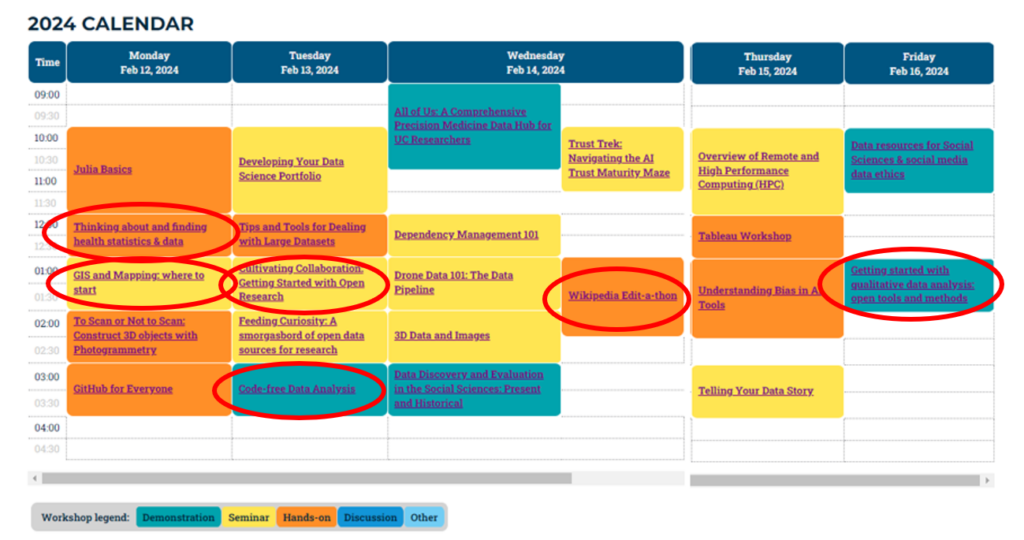
Come Help Us Create Wikipedia and Create Change, Edit by Edit, on February 15, 2023!

Wikipedia has become so central to our lives that we count on it to represent reality, and solid fact. When we encounter a new phenomenon, we check out our trusty online friend for more information. So, it was fascinating to me recently to see the lines blur between fiction and reality, when Wikipedia was used as a visual and social cue in the movie Tár, starring Cate Blanchett, about a famed female conductor. In the movie, one of the clues to the coming turbulence in Lydia Tár’s life is a screen capture of a mystery editor changing items on the conductor’s Wikipedia entry. It looked and felt so real, the filming and Blanchett’s performance so rivetingly vivid, that many people believed the film was a biopic of a real person. As Brooke LaMantia wrote in her article, No, Lydia Tar is Not Real,
“When I left the theater after watching Tár for two hours and 38 minutes, I immediately fumbled for my phone. I couldn’t wait to see actual footage of the story I had just seen and was so ready for my Wikipedia deep dive to sate me during my ride home. But when I frantically typed “Lydia Tar?” into Google as I waited for my train, I was greeted with a confusing and upsetting realization: Lydia Tár is not real…the film’s description on Letterboxd — “set in the international world of classical music, centers on Lydia Tár, widely considered one of the greatest living composer/conductors and first-ever female chief conductor of a major German orchestra” — is enough to make you believe Tár is based on a true story. The description was later added to a Wikipedia page dedicated to “Lydia Tár,” but ahead of the film’s October 28 wide release, that page has now been placed under a broader page for the movie as a whole. Was this some sort of marketing sleight of hand or just a mistake I stumbled upon? Am I the only one who noticed this? I couldn’t be, right? I thought other people had to be stuck in that same cycle of questioning: Wait, this has to be real. Or is it? She’s not a real person?
Wikipedia is central to LaMantia’s questioning! While it’s easy to understand people’s confusion in general, the Tár Wikipedia page, created by editors like you and like me, is very clear that this is a film, at least as of today’s access date, January 20, 2023… On the other hand, did you know you can click on the “View History” link on the page, and see every edit that has been made to it, since it was created, and who made that edit? If you look at the page resulting from one of the edits from October 27, 2022, you can see that it does look like Tár is a real person, and in fact, a person who later went on to edit this entry to make it clearer wrote, “Reading as it was, it is not clear if Lydia actually exists.” Maybe I should write to LaMantia and let her know.
I tell this story to show that clearly, Wikipedia is a phenomenon, and a globally central one, which makes it all the more amazing that it is created continuously, edit by edit, editor by editor. There are many ways in which our own and your own edits can create change, lead to social justice, correct misinformation and more. While it’s easy to get lost in the weeds of minute changes to esoteric entries, it’s also possible to improve pages on important figures in real-life history and bring them into our modern narrative and consciousness. And it’s easy to do!
If you are interested in learning more, and being part of this central resource, we warmly welcome you and invite you to join us on Wednesday, February 15, from 1-2:30 for our 2023 Wikipedia Editathon, part of the University of Calif0rnia-wide 2023 Love Data Week. No experience is required—we will teach you all you need to know about editing! (but, if you want to edit with us in real time, please create a Wikipedia account before the workshop). The link to register is here, and you can contact any of the workshop leaders (listed on the registration page) with questions. We look forward to editing with you!
Coming Soon: Love Your Data, from Editathons to Containers!
UC Berkeley has been loving its data for a long time, and has been part of the international movement which is Love Data Week (LDW) since at least 2016, even during the pandemic! This year is no exception—the UC Berkeley Libraries and our campus partners are offering some fantastic workshops (four of which are led by our very own librarians) as part of the University of California-wide observance.
Love Data Week 2023 is happening next month, February 13-17 (it’s always during the week of Valentine’s Day)!
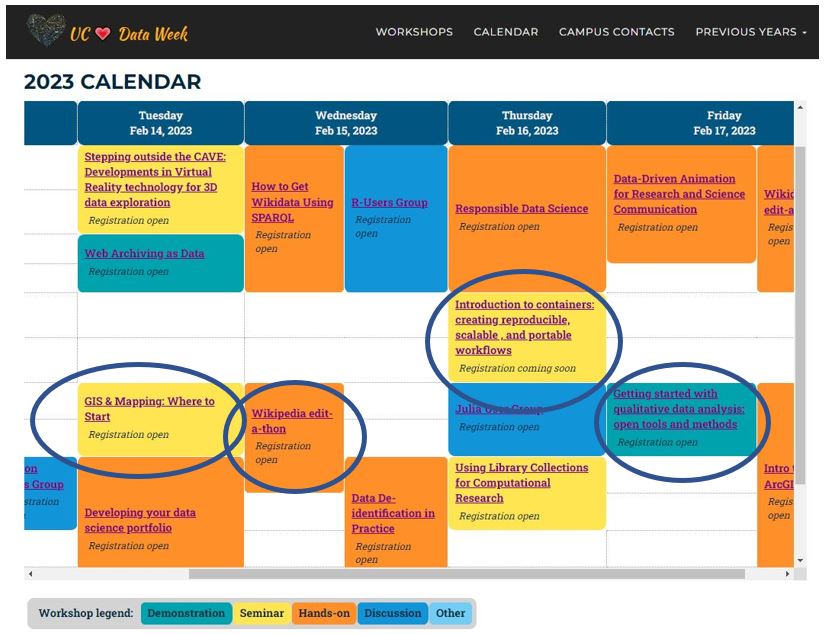
UC Berkeley Love Data Week offerings for 2023 include:
Wikipedia Edit-a-thon (you can also dip into Wikidata at other LDW events)
Textual Analysis with Archival Materials
Getting Started with Qualitative Data Analysis
All members of the UC community are welcome—we hope you will join us! Registration links for our offerings are above, and the full UC-wide calendar is here. If you are interested in learning more about what the library is doing with data, check out our new Data + Digital Scholarship Services page. And, feel free to email us at librarydataservices@berkeley.edu. Looking forward to data bonding next month!
Wikipedia, Knowledge Equity, and Researching Herstories

You may have heard that last week the Library hosted its now-annual Wikipedia edit-a-thon, a gathering of editors and fans of this amazing online resource (side note: speaking as a librarian who was taught that since Wikipedia is crowd-sourced it’s unreliable, I can say I’ve come to a much more appreciative stance after learning about its culture of fact-checking and reference, and in fact using the reference lists in articles on many occasions). Wikipedia is central to our knowledge landscape, and the UC Berkeley Library’s edit-a-thons are held so that we can improve on this landscape in the areas of art + feminism, and race + justice.
This year, because the edit-a-thon was virtual, we organizers were able to present a fascinating two-hour keynote and workshop given by Dr. Alexandria Lockett, of Spelman College in Atlanta. Dr. Lockett is a long-time Wikipedian (she started editing in 2003) who incorporates Wikipedia in her teaching, and works to question the politics of citation practices, representation, and knowledge equity there (check out her recent book chapter, “Why Do I Have Authority to Edit the Page? The Politics of User Agency and Participation on Wikipedia”).
Her talk, “Research for Knowledge Equity” had important content for everyone attending, whatever their Wikipedia editing level or interest. Dr. Lockett focused on knowledge production, and how that can “marginalize Black, Indigenous, People of Color (BIPOC) scholarship and media, LGBTQ persons, African scholarship and media, women scholars regardless of color, disabled scholars, etc.” (she noted that there are Wikipedia campaigns meeting this issue, particularly #CiteBlackWomen and “CiteaSista”). She then went on to outline methods and resources for doing herstorical research, particularly on the history of Black women. Bringing the perspectives of inclusive knowledge production and informed research strategies to our editing means that Wikipedia can start to become a force for change from within, moving towards knowledge equity. As Dr. Lockett notes, “This is intellectual labor, not just tacking on facts. It will change your perspectives on knowledge production.” Want to know more? Dr. Lockett has made her slides and her list of potential articles to edit available!
After the workshop, the edit-a-thon continued in its classic format, superimposed onto Zoom. We had an editing instruction session, a breakout room for one-on-one help, and one for open editing for those who wanted a collegial space in which to work. I, for one, felt fired up by what I’d heard from Dr. Lockett, and decided to see if I could improve an article on Carol Blanche Cotton (Bowie), a Black psychologist whose dissertation focused on cognitive testing of children with disabilities, and whose name was on a list of articles needing edits. Using my librarian super searching skills (AKA Google Scholar in this case), I found an online reference to her great grandmother, Rebecca Harris, in a 1983 article titled “The Antebellum ‘Talented Thousandth’: Black College Students at Oberlin Before the Civil War”. Once I did that, I was able to add the section circled in the image above to Dr. Cotton’s Wikipedia page. It felt so rewarding to connect Dr. Cotton to her ancestor, who believed so strongly in education that she moved her entire family to Oberlin, and along the way I learned more about two women—Dr. Cotton and Rebecca Harris—who I will never forget. I hope you, reader, will have the chance to get just as excited about learning and editing, in one of the many online editathons happening now, and also at our 2022 edit-a-thon—watch this space!
Library’s Wikipedia Edit-a-Thon: Coming Soon (3/10) to a Screen Near You!
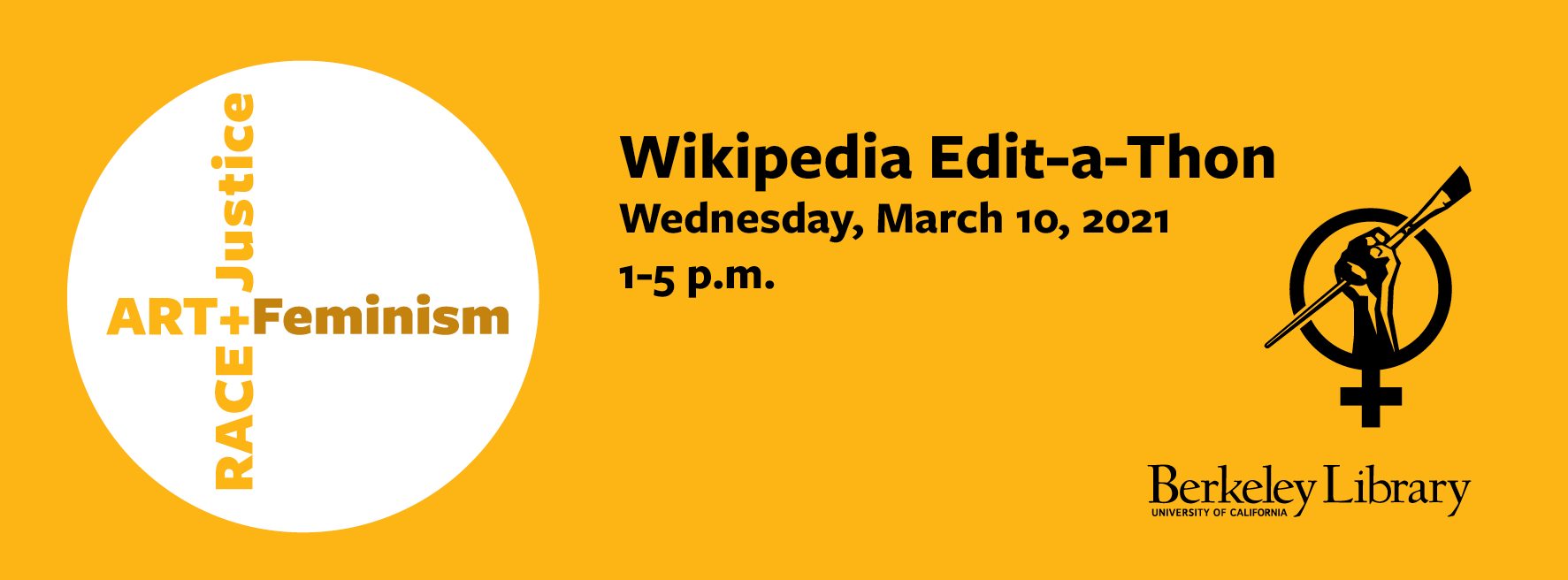
For many of us in the library, last year’s Wikipedia Edit-a-Thon on March 4 was the final program we held in person before the pandemic lockdowns (we actually wondered at the time whether attendance would be down due to the spread of the virus, but we had a great crowd).
Happily for us, the edit-a-thon, which is an event that gathers people together to expand and improve on the amazing information resource Wikipedia, can easily transition to an online format! The National Network of Libraries of Medicine has been holding national online edit-a-thons for years, and there are many other wonderful offerings, themed and general, to take advantage of online (check out this set of events “Honoring Indigenous Writers” from the University of British Columbia).
So, this year, our edit-a-thon will be virtual. Please come edit with us on Wednesday, March 10, from 1:00-5:00 PM! (or any portion of that time that works for you) We’ll use Zoom as a way to hold our guest speaker session and workshops on how to edit, and we will even have breakout rooms for the various editing preferences and needs of attendees. More information and the schedule can be found here; the only thing you need to do is register using this form (in order to get the Zoom link), and show up online on the day! (It would also be great, if you want to actually edit, to set up your Wikipedia account in advance)
And, about the guest speaker aspect of the event—this year, we are thrilled to offer a two-hour Wikipedia workshop (from 1:00-3:00 PM) created and led by Dr. Alexandria Lockett, from Spelman University in Atlanta, GA. Dr. Lockett will discuss how both new and experienced editors can meaningfully contribute to underrepresented knowledge of Wikipedia through alternative research practices.
Questions? Feel free to email us at editathon@lists.berkeley.edu, and we hope to “see” you on March 10!
Come Edit with Us! (at the Wikipedia Edit-a-Thon, 3/4/20)

Umberto Eco, author of The Name of the Rose, said, “The cultivated person’s first duty is to be always prepared to rewrite the encyclopedia.” But, in the case of Wikipedia, we actually get to write the encyclopedia! If you are interested in Wikipedia as a phenomenon and what happens behind the scenes, in learning to edit, and/or in improving the quality and diversity of content in this important resource, join us at the upcoming Art + Feminism + Race + Justice Wikipedia Edit-a-Thon.
Why is this so important, anyway? It’s because Wikimedia’s race and gender trouble is well-documented. While the reasons for the gap are up for debate, the practical effect of this disparity is not: content is skewed by the lack of participation by women and underrepresented groups. This adds up to an alarming absence in an important repository of shared knowledge, which many groups are starting to address.
Art+Feminism is a national campaign improving coverage of cis and transgender women, non-binary folks, feminism and the arts on Wikipedia, and at UC Berkeley we have teamed up with the American Cultures program’s Race+Justice edit-a-thon. Edit-a-thons are a powerful way to address Wikipedia’s gaps in content. The Library is also joined in sponsorship of the event by 150 Years of Women at Berkeley, and suggested editing needs will include topics related to Berkeley alumnae of note.
So, join us in 405 Moffitt Library on Wednesday, March 4 between 11:00am and 5:00pm for an all-day communal updating of Wikipedia entries. Drop in any time! We will provide tutorials for the beginner Wikipedian, reference materials, and refreshments. Check out the schedule at bit.ly/wiki-berkeley for timing of informative talks, instruction sessions, and more. Set up your Wikipedia editing account in advance, or we can help you on the day. Bring your laptop, power cord and ideas for entries that need updating or creation! For the editing-averse, we urge you to stop by to show your support. People of all races and gender identities are invited to participate.
See you there!
NOTE: A Cal ID card is required to enter Moffitt, so those without a Cal ID card need to RSVP to attend the event by March 3.
The Library attempts to offer programs in accessible, barrier-free settings. If you think you may require disability-related accommodations, please contact us.
Art + Feminism + Race + Justice Wikipedia Edit-a-Thon
Join us at the Art+Feminism+Race+Justice Wikipedia Edit-a-thon
Tuesday, March 5, 2019
12-5 p.m.
Moffitt Library, Room 405
bit.ly/wiki-berkeley
Wikimedia’s race and gender trouble is well-documented. While the reasons for the gap are up for debate, the practical effect of this disparity is not: content is skewed by the lack of participation by underrepresented groups. This adds up to an alarming absence in an important repository of shared knowledge.
Let’s change that. Join us in 405 Moffitt Library on Tuesday, March 5 between 12noon-5:00pm for an all day communal updating of Wikipedia entries. We will provide tutorials for the beginner Wikipedian, reference materials, and refreshments. Drop in any time; trainings take place every hour on the hour.
Art+Feminism is a national campaign improving coverage of cis and transgender women, feminism and the arts on Wikipedia, and at UC Berkeley we will team up with the American Cultures program’s Race+Justice edit-a-thon. So, bring your laptop, power cord and ideas for entries that need updating or creation! For the editing-averse, we urge you to stop by to show your support. People of all races and gender identities are invited to participate.
- People of all gender identities and expressions welcome.
- Bring a laptop or mobile device if you can.
- Drop in for half an hour or stay for the whole afternoon — it’s up to you!
- No editing experience necessary; we’ll provide training and assistance.
- Optional: Training sessions every hour on the hour.
- Get a headstart! Create an editing account ahead of time.
- Refreshments will be provided.
Interested? Learn more here and RSVP (encouraged, but not required). Don’t forget: your Cal ID card is required to enter Moffitt!
The Library attempts to offer programs in accessible, barrier-free settings. If you think you may require disability-related accommodations, please contact us at editathon@lists.berkeley.edu.
Let’s get editing!
Event: Art + Feminism + Race + Justice Wikipedia Edit-a-Thon
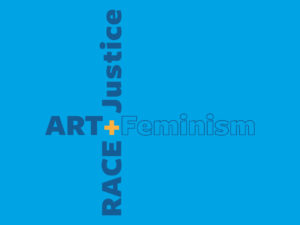 Drop in any time, stay as long as you like!
Drop in any time, stay as long as you like!
Tuesday, March 6, 12:00pm-5:00pm
Moffitt 405
Wikimedia’s gender trouble is well-documented. While the reasons for the gender gap are up for debate, the practical effect of this disparity is not: content is skewed by the lack of female participation. This represents an alarming absence in an important repository of shared knowledge. Let’s change that! Drop by the A+F Wikipedia Edit-a-Thon, learn how to edit Wikipedia and make a few changes of your own! This year, we’re partnering with the American Cultures program and expanding the scope to highlight the theme of race and justice. We are now calling it the Art+Feminism+Race+Justice Wikipedia Edit-a-thon.
People of all gender identities and expressions welcome.
Bring a laptop.
Drop in for half an hour or stay for the whole afternoon.
No editing experience necessary; we’ll provide training and assistance.
-
Optional: Training sessions at 12:30 & 2:30
-
Get a headstart! Create an editing account ahead of time.
Refreshments will be provided.
http://guides.lib.berkeley.edu/wikipedia-edit-a-thon
RSVP (encouraged, but not required)
A Cal ID card is required to enter Moffitt. The Library attempts to offer programs in accessible, barrier-free settings. If you think you may require disability-related accommodations, please contact us.
Lynn Cunningham
Art Librarian
UC Berkeley
510-642-8138
Art + Feminism + Race + Justice Wikipedia Edit-a-Thon
Art + Feminism + Race + Justice Wikipedia Edit-a-Thon
Drop in any time, stay as long as you like!
Tuesday, March 6, 12:00pm-5:00pm
Moffitt 405
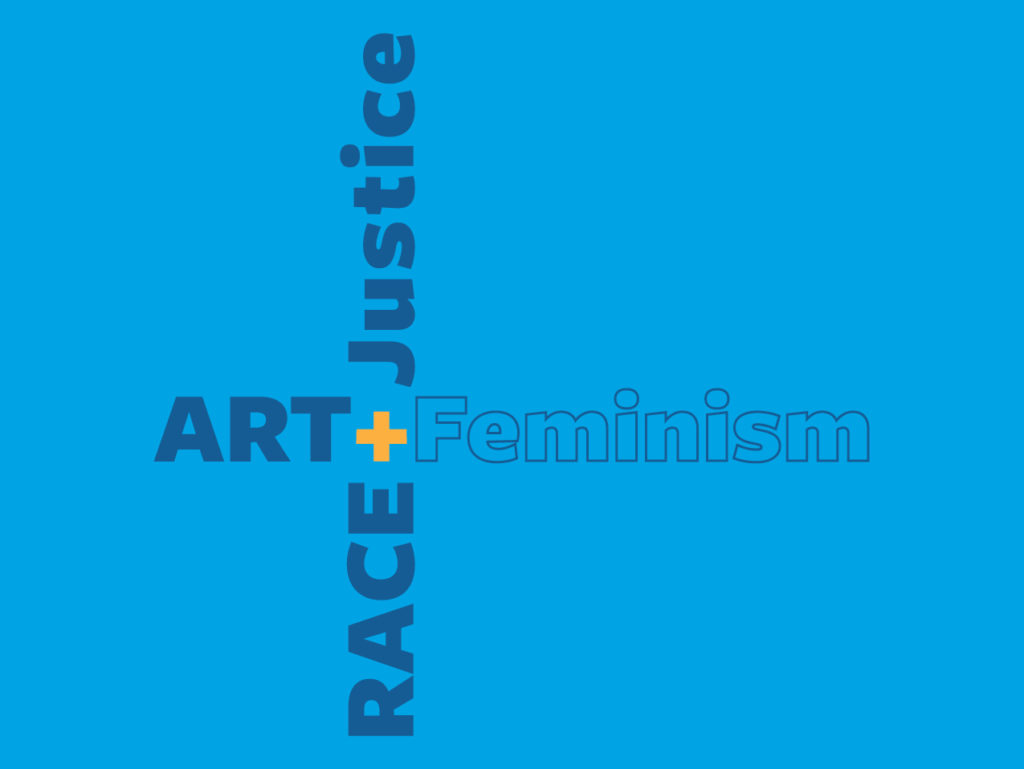
Wikimedia’s gender trouble is well-documented. While the reasons for the gender gap are up for debate, the practical effect of this disparity is not: content is skewed by the lack of female participation. This represents an alarming absence in an important repository of shared knowledge. Let’s change that! Drop by the A+F Wikipedia Edit-a-Thon, learn how to edit Wikipedia and make a few changes of your own! This year, we’re partnering with the American Cultures program and expanding the scope to highlight the theme of race and justice. We are now calling it the Art+Feminism+Race+Justice Wikipedia Edit-a-thon.
-
People of all gender identities and expressions welcome.
-
Bring a laptop.
-
Drop in for half an hour or stay for the whole afternoon.
-
No editing experience necessary; we’ll provide training and assistance.
-
Optional: Training sessions at 12:30 & 2:30.
-
Get a headstart! Create an editing account ahead of time.
-
-
Refreshments will be provided.
Learn more!
http://guides.lib.berkeley.edu/wikipedia-edit-a-thon
RSVP (encouraged, but not required)
A Cal ID card is required to enter Moffitt. The Library attempts to offer programs in accessible, barrier-free settings. If you think you may require disability-related accommodations, please contact us.
___________________________________________
Event: Art + Feminism Wikipedia Edit-a-Thon Tuesday, March 21

Art + Feminism Wikipedia Edit-a-Thon
Drop in any time, stay as long as you like!
Tuesday, March 21, 1:00pm-6:00pm
Moffitt 405
Wikimedia’s gender trouble is well-documented. While the reasons for the gender gap are up for debate, the practical effect of this disparity is not: content is skewed by the lack of female participation. This represents an alarming absence in an important repository of shared knowledge. Let’s change that! Drop by the A+F Wikipedia Edit-a-Thon, learn how to edit Wikipedia and make a few changes of your own!
- People of all gender identities and expressions welcome.
- Bring a laptop.
- Drop in for half an hour or stay for the whole afternoon.
- No editing experience necessary; we’ll provide training and assistance.
- Optional: Training sessions at 1:00, 3:00 and 5:00.
- Get a headstart! Create an editing account ahead of time.
- Refreshments will be provided.
Learn more!
http://guides.lib.berkeley.edu/wikipedia-edit-a-thon
A Cal ID card is required to enter Moffitt. The Library attempts to offer programs in accessible, barrier-free settings. If you think you may require disability-related accommodations, please contact us.
